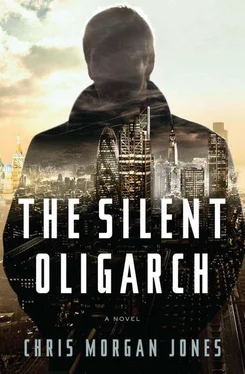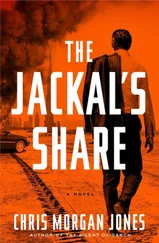PEOPLE FLITTED through his dreams in a feverish, messy procession. No one stayed for long. He could hear their chatter but not grasp what they were saying, even when they were talking to him. Some images stuck: Marina, her back to him, typing on a clanking typewriter a message that he couldn’t read; Oksana in the sea, beckoning; a huge, inflated Malin comical behind a tiny desk; Vika on a beach, pouring water from a plastic watering can onto the sand. Whenever he reached out the scene quickly switched: that lawyer, Beresford, steering him in a panic against a tide of people on some nameless Moscow street; Webster holding up a thick black hair like a piece of wool for him to inspect.
When he came to, he barely knew that time had passed, let alone how much. He was still; the car was still. The door behind him opened and his head flopped back into space. Then he felt hands on the collar of his coat pull him backward and up, and he was on his feet, standing on unruly legs. The icy night air braced him, and when he lifted his head he found he was with two men, one short and one tall, both wearing long coats and black caps. Behind him the car locked with a faint beep. The taller man put his arm around his shoulders and together they walked up a frozen pavement. The man was surefooted; Lock knew he wouldn’t slip.
For the first time Lock looked around him. The street was wide, dark, empty. He felt snow landing softly on his nose, on his cheek. A single car passed. Up ahead a brighter street crossed this one, and he could see traffic and trees lit yellow by the streetlights. The smaller man said something softly in Russian: keep him upright. If they’re happy talking Russian in front of me, Lock thought through the dense fug in his head, I’m not meant to survive.
He twisted away from the man holding him, trying to free his shoulders and run, but his feet could find no purchase on the ice and the man merely held him up, his powerful arm keeping him from falling. The smaller one, walking slightly ahead, turned and gave the other a taut look.
Twenty yards from the car the smaller man stopped by a large metal double door set back slightly from the road in a shallow recess. Lock looked up in time to see a massive building above him, several stories high and as wide as the whole block. Then he felt the strong arm around him pull him in. The smaller man pressed four numbers on a keypad with a gloved hand and the door opened.
Lock squinted at the sudden, stark light stretching ahead of him down a low, wide corridor. Its white walls were streaked with black marks, and plaster showed in places through flaking paint; the floor was tiled with large linoleum tiles, like a hospital. The men walked Lock, staggering, into the building, his feet skipping clumsily along, trying to keep up. They passed two dark-gray doors with small frosted windows and stopped by a pair of lifts on either side of the corridor. The smaller man pressed the button and called one. By the lifts were two large metal bins on wheels and in them Lock saw a white tangle of sheets like balled-up paper. There was a smell in the air of soap powder and steam that made him want to lie down in a clean bed in a warm home. He could feel his head lolling on his neck as if he were coming in and out of sleep.
The lift door opened with a low creak. Lock was shuffled in and propped against a metal wall, the tall man finally taking his arm away. He felt the lift jerk a little under him and presumed that it was going up. The smaller man pulled a tissue from his pocket and looking up at Lock dabbed flecks of vomit from his chin and lapels as a mother might clean up a child. Lock watched him with a puzzled, helpless frown. The man was pallid, brittle looking, his almost translucent skin showing clearly the shape of the skull beneath. His irises were light gray against milky whites. Straw-colored hair showed under his cap. He looked vicious but less powerful than his friend.
The lift trundled up. Sixth floor, seventh. Eventually it stopped on the eighth floor, the last. The small man pulled Lock away from the wall by the arm and the door slid slowly open. From the lift opposite a maid in a pink housecoat, a white maid’s cap on her head, was pulling a trolley laden high with toilet paper and bath caps and slippers in transparent plastic bags. Her back was to Lock and the two Russians and they were forced to wait. As she reversed out onto the landing she turned, saw the three men, and began to smile before she realized that something about them was not right. The small man had his arm linked through Lock’s, and the taller of the two was right behind them, ready to push Lock out of the lift. The maid looked at Lock as if for explanation. In that moment he shrugged himself free of the smaller man’s grip and half lunged, half fell toward the trolley, now blocking the corridor. His shoulder smashed into it, wheeling it around and knocking pens and tiny bottles of shampoo onto the floor. Pushing the trolley end into the small man, who tottered backward, off balance, Lock backed into the other lift, clawing at the closing door for support and pressing madly at the bank of buttons. He watched the tall man try to push past the maid; as she crouched to pick up her things he stumbled over her back. The last thing Lock saw through the narrowing crack was the man’s outstretched hand, failing to find a grip.
It was quiet in the lift. With a gentle jolt it began to descend. Lock leaned against the wall, the metal cold against his temple. His nausea had subsided, but his head throbbed with grim intensity. So this is what had happened to Dmitry. It was possible that he wasn’t even conscious when he died. He may not have known.
The lift stopped. The fifth floor: in his panic Lock had pressed the wrong button. As the door opened he hit frantically at the ground-floor button, then at the button that closed the doors. It appeared to do nothing; in its own time the door inched back. Above him Lock thought he could hear the metallic clatter of steps being taken three at a time. When the door shut the noise stopped.
He pinched his eyes with his hand. He had to work out what to do. He felt in his pocket for his phones but found only the smashed remains of one. Christ. The numbers over the door counted slowly down. No ideas came to him and he struggled to stand. He took deep breaths to steady himself. Two. One. Ground. The corridor was still empty. He set off away from the street door, lurching against the walls. At the end of the corridor he turned right, on instinct, shouldering into a maid carrying an armful of towels. Ahead of him was a pair of wooden swing doors, in each one a small glass pane at head height. He heard a door open behind him and quick steps coming his way; over his shoulder he saw the small man running toward him, his rubber shoes squeaking on the linoleum, his coat open and swinging at his sides. Lock forced his legs to work faster but he couldn’t control them. They gave, as if the tendons had gone, and he crashed through the doors in a running fall, rolling into the room beyond.
He was on his back. His hands felt carpet under him, and he could hear piano music playing. Lumbering over onto his knees he looked sluggishly around. People were looking at him: people in deep chairs having drinks, people standing at reception checking in. In the center of the room, setting off the sober marble and the deep dark wood, was a vase full of tall flowers: lilies, delphiniums. He was in the lobby of a hotel. Still on his knees, Lock glanced behind him. Through the glass in the door he could see the black cap and ghost eyes of the small man, watching him. Lock stood up, painfully, and steadied himself. The concierge and a receptionist were having an urgent, whispered conversation; then the concierge gestured to a doorman, who was walking purposefully toward Lock. Lock held his hand up, and started walking shakily past the flowers toward the revolving glass door that led onto the street, feeling everyone’s eyes on his back. The piano music played on.
Читать дальше












